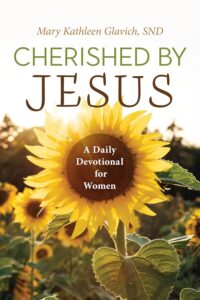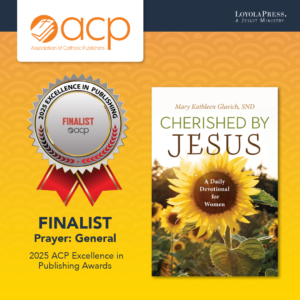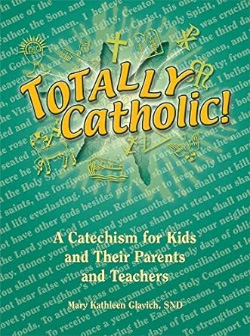Mary on My Mind
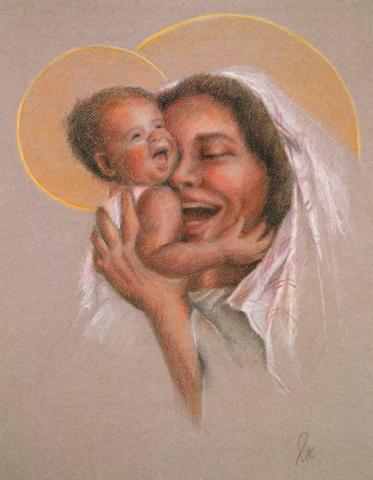
These days I am preparing for three events about Mary: a day of recollection, a two-day retreat, and a presentation Why and How to Teach about Mary: Fifty Nifty Ideas (At Least) at the National Catholic Education Association (NCEA) convention in Dallas. That talk draws on activities in my latest book, Leading Young People to Mary. As a Sister of Notre Dame, I’m proud to say that I have four books on our Blessed Mother published. The most popular, and my favorite, is Heart to Heart with Mary: A Yearly Devotional.
Frequently people let me know how much that book of reflections from Mary means to them. It’s uncanny how the reading for the day seems tailor-made for the person reading it. (That’s the Holy Spirit at work!) They order copies of the book for their relatives and friends. The most touching news was that at a funeral for a young woman the book was placed on her casket and a portion of it was read in the eulogy.
So today as we begin a new month, I’m sharing the reflection from that book for that day. I hope that it is just what one of my blog readers needs to hear today!
Guilt, Be Gone!
February 1
My child, do past sins and embarrassing, uncomfortable memories weigh like heavy stones on your heart? If so, this saddens me, for I want nothing more than for you to be completely happy. You are only human, prone to weaknesses and lapses. But you are also a beloved child of God and my own dear child. We love and understand you, no matter what.
If only you would see yourself as I see you: a reflection of God’s image and likeness, and a person whose destiny is eternal glory. If only you would love yourself as I love you. I know you through and through and realize that you desire to be good and to follow in the way of my son. Let the past failings stored in your mind melt away as you turn your heart toward God and receive his mercy.
I will gladly obtain many blessings for you from my divine son to help you obey God and live the Gospel values. Rise above your guilt and embrace grace.
What sin or fault do you find most difficult to overcome? Ask Mary for the grace to be free of it once and for all.
Here are a few depictions of Mary that I found unusual as I was preparing my PowerPoint show on her:


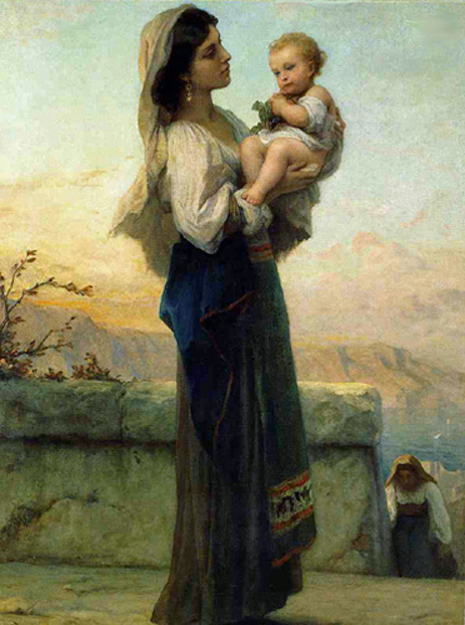
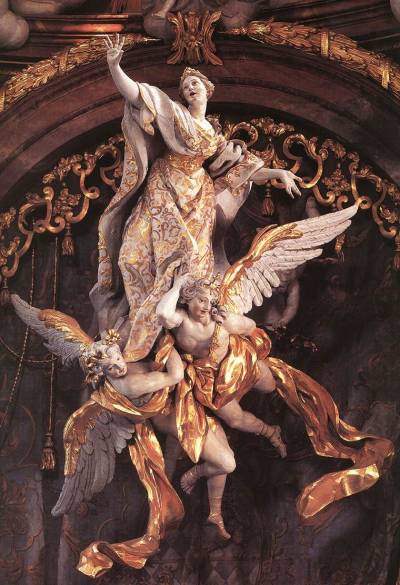

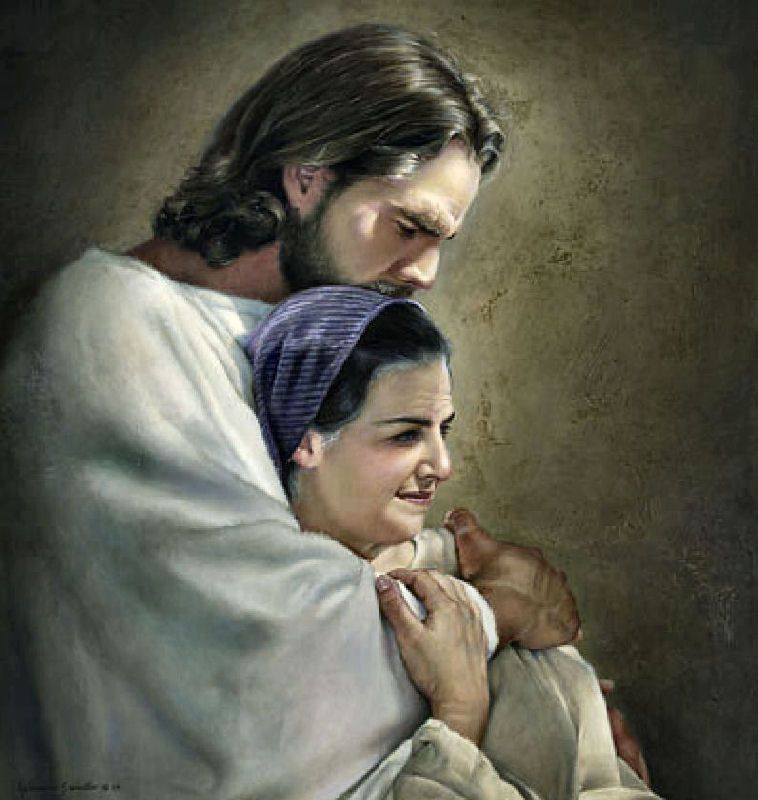
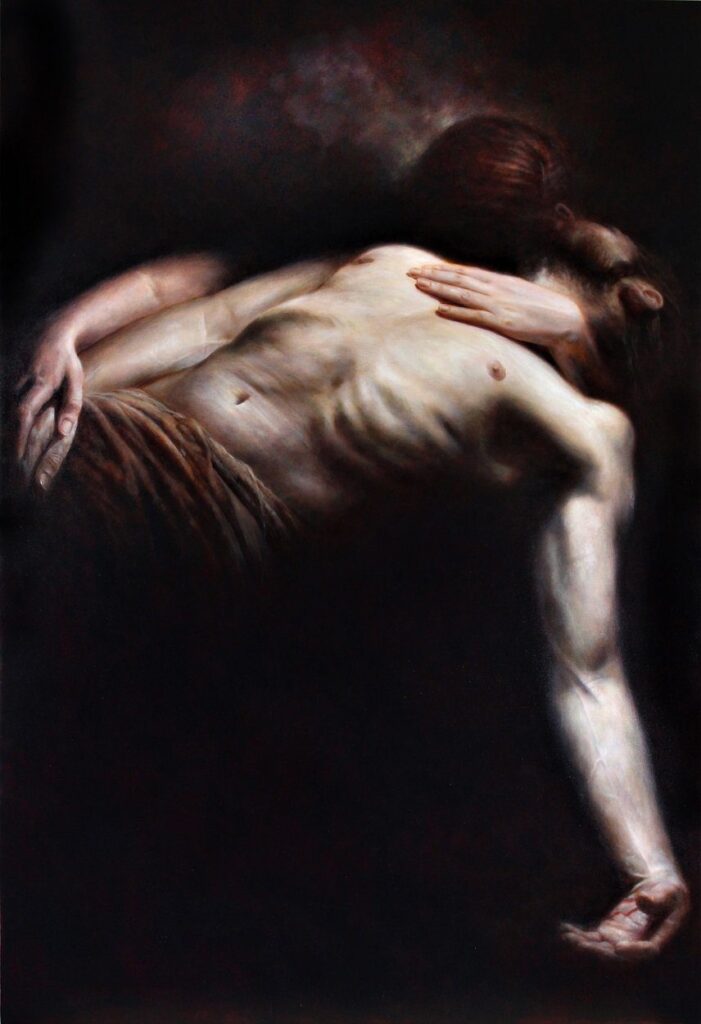
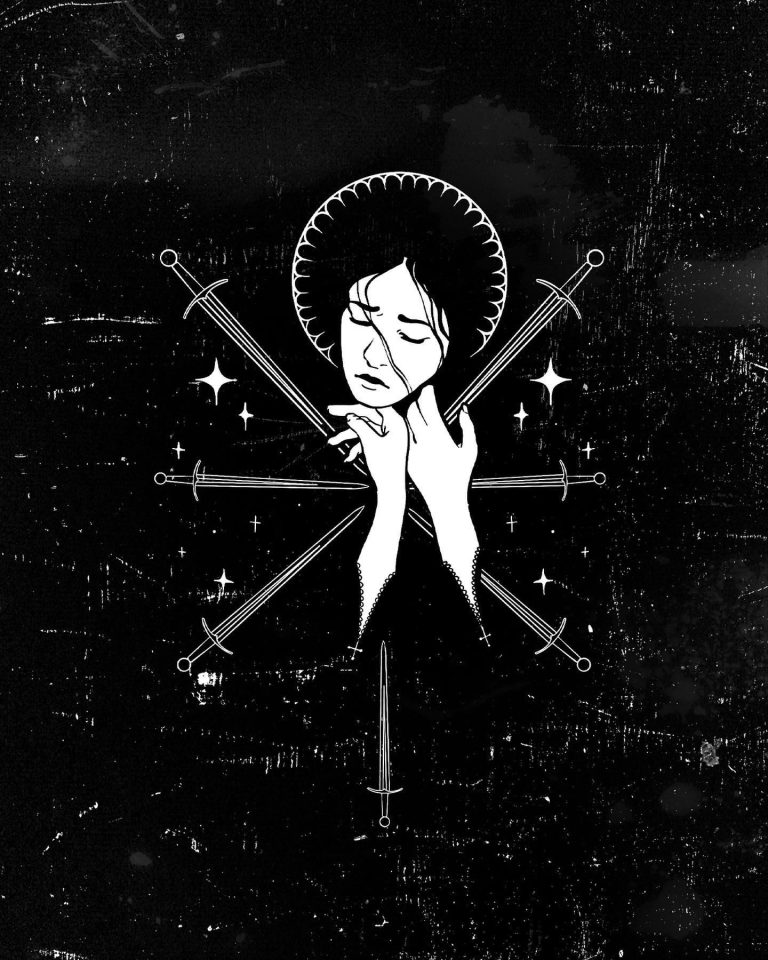
Divine Messages in Dreams

I just read the book Dearest Sister Wendy… A Surprising Story of Faith and Friendship. It is a collection of daily email letters between Sister Wendy Beckett (consecrated virgin and art critic) and Robert Ellsberg (publisher and author) during the last three years of her life. The two discuss matters of life and faith. Ellsberg often recounts his dreams in length. These are like dramas—a far cry from my own dreams. The two glean messages from his dreams. The book prompted me to write a post on dreams. Then I discovered I had written one a few years ago. Here it is with some adaptations:
After reading about Ellsberg’s dreams, one night I asked God if he would send me a message in a dream. Again, I had no story-dream, but only a brief event: I was handed a pretty, square box. On its side was written the word Fortitude. When I woke up, at first I thought, Well, that wasn’t much. Later I realized that the dream really did hold a message for me. At the time I was facing a problem that was causing me grief. Planning how to deal with it was constantly my mind. It seems as though God were reminding me to act with fortitude (courage) in solving the problem. And, yes, fortitude is a gift of the Holy Spirit that I received when I was baptized.

Scripture reveals that God sometimes communicates through dreams. In the Old Testament, the patriarch Joseph’s dream about sheaves and stars foretold that his eleven brothers would someday do him homage. Later Joseph’s ability to interpret prophetic dreams, in particular the Pharaoh’s, catapulted him to power and helped to feed the world during a famine. Another hero, Daniel, while a prisoner in Babylon, explained to King Nebuchadnezzar the dire meaning of his dreams for his country and his future.
In the New Testament, God spoke to St. Joseph in dreams four times. In a dream Joseph learned about Mary’s Son and was told to marry her. Later he learned he must take his little family to Egypt to save this divine Son from Herod’s wrath. After Herod died, twice Joseph was given directions: to move back and where to move. The Magi were warned in a dream not to report back to Herod.
Saints also received messages in dreams. St. Patrick was guided in a dream to escape captivity. Later in another dream he was instructed to go to Ireland.
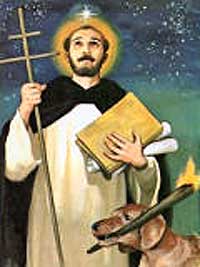
Before St. Dominic was born, his mother dreamed of a black and white dog carrying a burning torch. The Latin name for the Dominicans, who set the world on fire for God, is Domini canes (dogs of the Lord).
St. John Bosco dreamed that vicious dogs were turned into lambs, a hint of his future work of transforming rough boys into people of integrity. One book is entitled “The Forty Dreams of St. John Bosco.”
There is no reason to doubt that God speaks to you through dreams too. After all, God can speak through anything.
The year I entered the convent I had a strange dream. My father had lost his faith during World War II. One night I dreamed that I was helping him climb a steep hill. He was breathing hard. Then he said, “I see saints and angels at the top.” This made me feel happy in my dream. When I awoke, I was worried about my father. If I recall, we had a little blue book in which we recorded our intention and good work for the day. My intention that day was my father. During lunch, although I was only a postulant, the novice director asked me to come to her room. There she told me that my mother had called. My dad was in the hospital. Sister said the phone connection was bad, but it sounded like he had cancer. My dad worked night shift. When I called my mother, she said he didn’t have cancer. During the night at work my father’s lungs had collapsed. He couldn’t breathe. My father lived years after that. Right before he died, he was anointed and received Communion.
Books and workshops give advice for analyzing dreams. It’s said that only you can interpret your dreams.
By the way, did you know that St. Raphael the Archangel is the patron against nightmares? This is because of what he did for Tobias as told in the Old Testament book of Tobit. A demon had killed seven of Sarah’s husbands on their wedding night. After Tobias married Sarah, that night Raphael chased the demon faraway to Egypt and bound him hand and foot!
• Have you ever received a message from God in a dream?
Cornelia Connelly, Woman of Trust
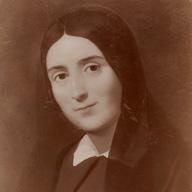
As I was preparing to give a woman’s retreat on our Sorrowful Mother, I wondered what example I could offer of a woman who suffered much and never gave up the faith. Cornelia Connelly came to mind. You’ve probably never heard of her, but her incredible, arresting story is worth telling. Read on.
Cornelia was born in Philadelphia in 1809. Her father died when she was 9; her mother died when she was 14, and so, an orphan, she lived with her half sister, Isabella, and her husband. She converted from being Presbyterian to Episcopalian.
In 1831 against Isabella’s wishes, Cornelia married Rev. Pierce Connelly, an Episcopalian minister five years older. The couple moved to Mississippi when he was appointed rector of a church there. Two children were born to them.
In 1835 Pierce resigned his pastorate to explore the Catholic Church, which at that time was persecuted in the United States. The result was that he and Cornelia both became Roman Catholic and moved to Rome. But in the meantime, they were without income. Cornelia said she would rely “on the kind providence of God.”
Calamities came for Cornelia. In 1839 a daughter was born but died after six weeks. In 1840, pushed by a dog, her two-year-old son fell into a vat of boiling sugar and died in her arms. Cornelia began a life-long devotion to Mary as Mother of Sorrows.
The year her son died, when she was four months pregnant with their fifth child, Pierce told her that he wanted to become a priest. According to the current law, this meant she had to take a vow of chastity and was encouraged to enter a religious order. It would break up the family. The couple moved to England.
In 1844 Cornelia entered the Sacred Heart Convent, taking her baby son with her. Pierce had permission to visit her once a week. Strangely, Pierce was ordained in the convent chapel. His visits to Cornelia had to end.
In 1846 Cornelia founded her own community, the Society of the Holy Child Jesus in England. She said it was founded on a breaking heart. The community educated poor children in many schools in England.
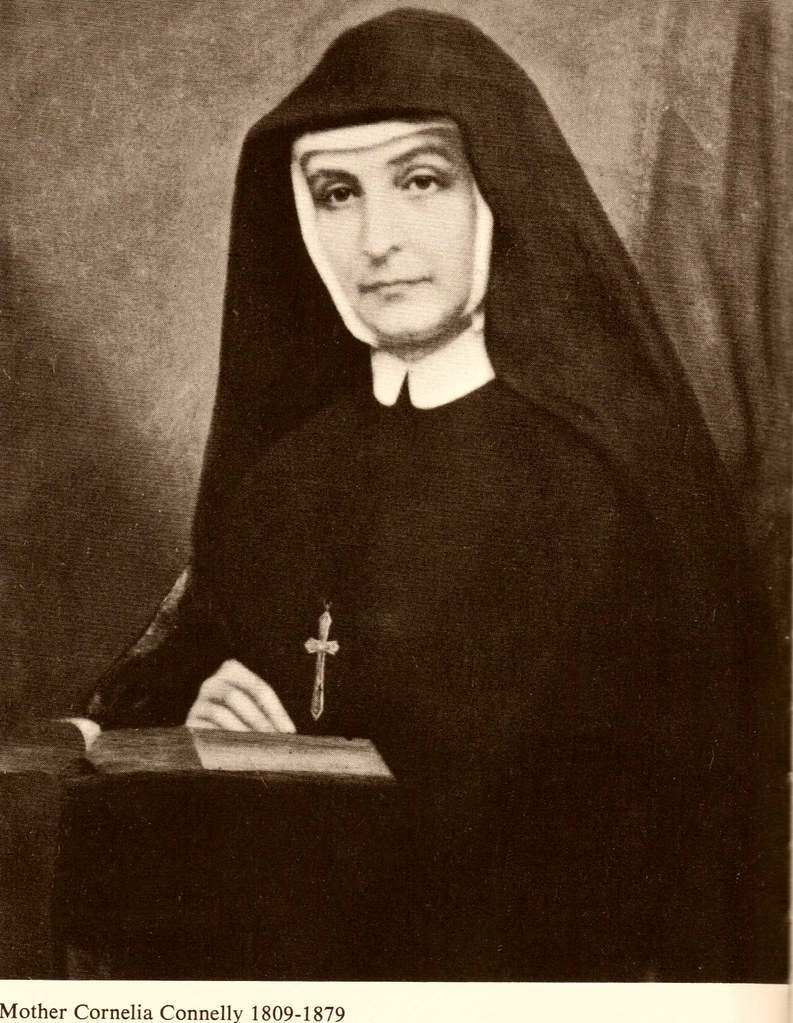
In 1847 Cornelia made perpetual vows. The following year Pierce, who illegally paid her a visit, eventually abandoned the priesthood and removed their children from the schools they attended. He was hoping to force Cornelia to return to him as his wife. Although she still loved him, she stood firm.
Pierce spread ugly rumors about her. He pretended to be the founder of her community and opened a lawsuit against her. The judge decided she should return to Pierce or go to prison. The public, mostly Protestant, favored Pierce. In the end a special council suspended the judgment, but Cornelia had to pay the court costs! Pierce became vocally anti-Catholic.
Under British law a man had custody over his children. Pierce took them, and Cornelia was alienated from her children for the rest of her life.
After dealing with further trials related to her community and its relationship with clergy, Cornelia died in 1879. Today her Sisters of the Society of the Holy Child of Jesus work in fifteen countries.
She was declared venerable in 1992, the step before beatification, recognizing the extraordinary “faith, hope, and spirit of charity with which this strong, but humble, sweet, upright, and prudent
woman bore [her] difficulties.”
• How do you find strength to deal with the crosses that come across your life?
Best Gift for Jesus
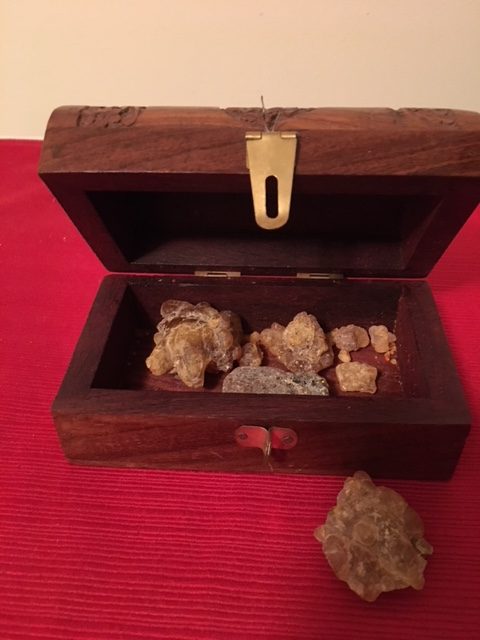
Visitors from Abu Dhabi once brought me the gift of frankincense from Yemen in a beautiful carved box. It is pictured here. Frankincense, which is the resin of a certain tree, has a strong scent that lingers on your fingers when you touch it.
We’ve just the feast of the Epiphany, celebrating the visit of the wise men to the infant Jesus. As you probably know, they presented gifts of gold, frankincense, and myrrh. A cartoon states that if women had come, their gifts would have been practical ones, like diapers. Nevertheless, the three gifts of the wise men are symbolic: gold for a king, frankincense for a God, and myrrh for suffering. (Myrrh was a spice used in burial.)
The feast prompts us to muse about what gift we would give Jesus. No doubt you are familiar with the song “The Drummer Boy.” He gift is playing on his drum for Baby Jesus. (Hopefully Mary had not just gotten her baby to fall asleep!) Christina Rossetti composed this charming poem:
What can I give Him, poor as I am?
If I were a shepherd, I would bring a lamb;
If I were a wise man, I would do my part;
Yet what can I give Him?
Give Him my heart.
Christina had the right idea. What would make Jesus the happiest would be the gift of our love. We show him our love by giving him ourselves. We do this each morning in the morning offering prayer: “O Jesus, I offer you my prayers, works, joys, and sufferings of this day….” As a Sister, my night prayer begins, “O Jesus, I offer you again through Mary’s hands all the works of this day.”

At each Mass we offer God ourselves. A priest suggested that we imagine ourselves with the host on the paten when it is lifted to God. One of my favorite prayers is this one of St. Ignatius:
Take, O Lord, and receive my entire liberty,
my memory, my understanding and my whole will.
All that I am and all that I possess, you have given me:
I surrender it all to you to be disposed of according to your will.
Give me only your love and your grace;
with these I will be rich enough and will desire nothing more. Amen.
During the day we can renew our gift: offer God our success at winning a contest, offer our hard work, offer the pain of a headache, the sadness of a rejection, the humiliation of a failure. The list can go on.
Psalm 116:12 is “What shall I return to the Lord for all his goodness to me?” The day I was interviewed by the superior before entering the convent, she asked, “Why do you want to be a Sister?” I answered somewhat like this: “God has been so good to me, I want to give him all that I am. This seems to be the best way for me to do that.”
Here is another prayer that I adopted in high school. It’s attributed to St. Francis Xavier.

O God, I love thee for yourself
And not that I may heaven gain,
Nor yet that they that love you not
Must suffer hell’s eternal pain.
You, O my Jesus! you did me
Upon the cross embrace.
For me did bear the nails and spear
and manifold disgrace;
And griefs and torments numberless;
And sweat of agony;
E’en death itself—and all for one
Who was your enemy.
Then why, O blessed Jesus Christ,
Should I not love you well:
Not for the sake of winning heaven
Or of escaping hell;
Not with the hope of gaining aught,
Not seeking a reward;
But as you have loved me,
O everloving Lord.
E’en so I love thee and will love,
And in your praise will sing
Solely because you are my God
and my eternal King.
In God’s eyes, the gift of our love is his greatest treasure. (And you needn’t be a Sister to offer that.)
Here is a gentle version of the simple hymn “I Love You, Lord.”
A commercial: You might be moved and inspired by reading my book A Love Affair with God.
Christmas Joy and Laughter
Christmas season is a time of great joy. In case you haven’t seen my Noel cartoons on Facebook last year, here is the collection for your pleasure. Rejoice and be glad!
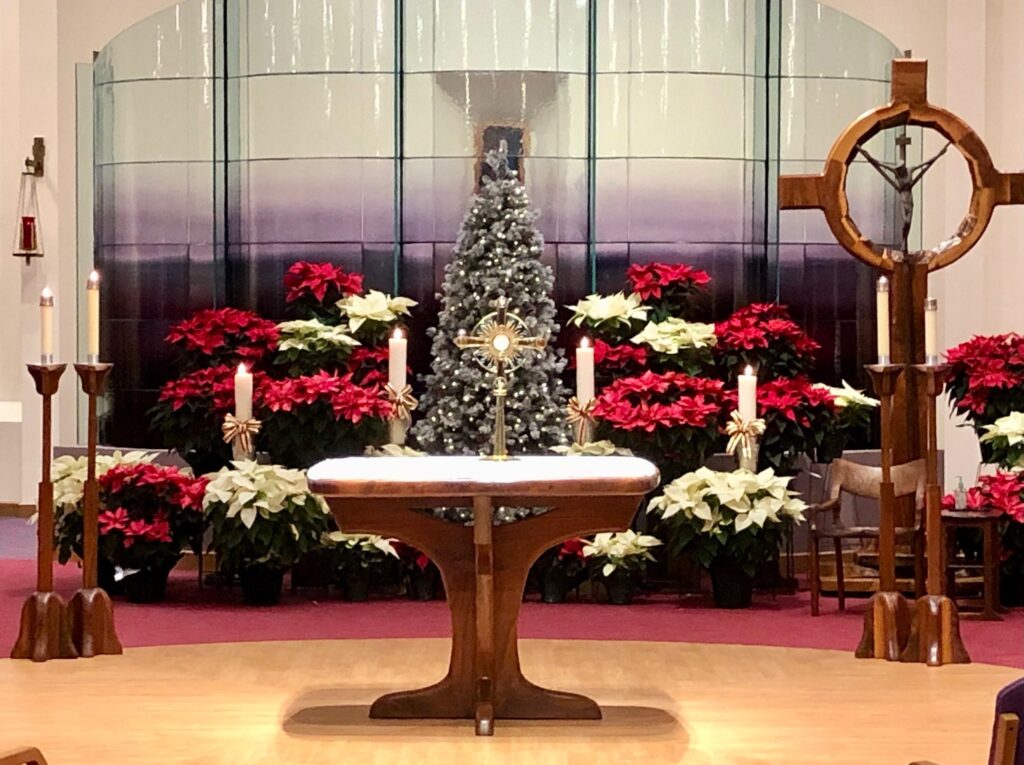








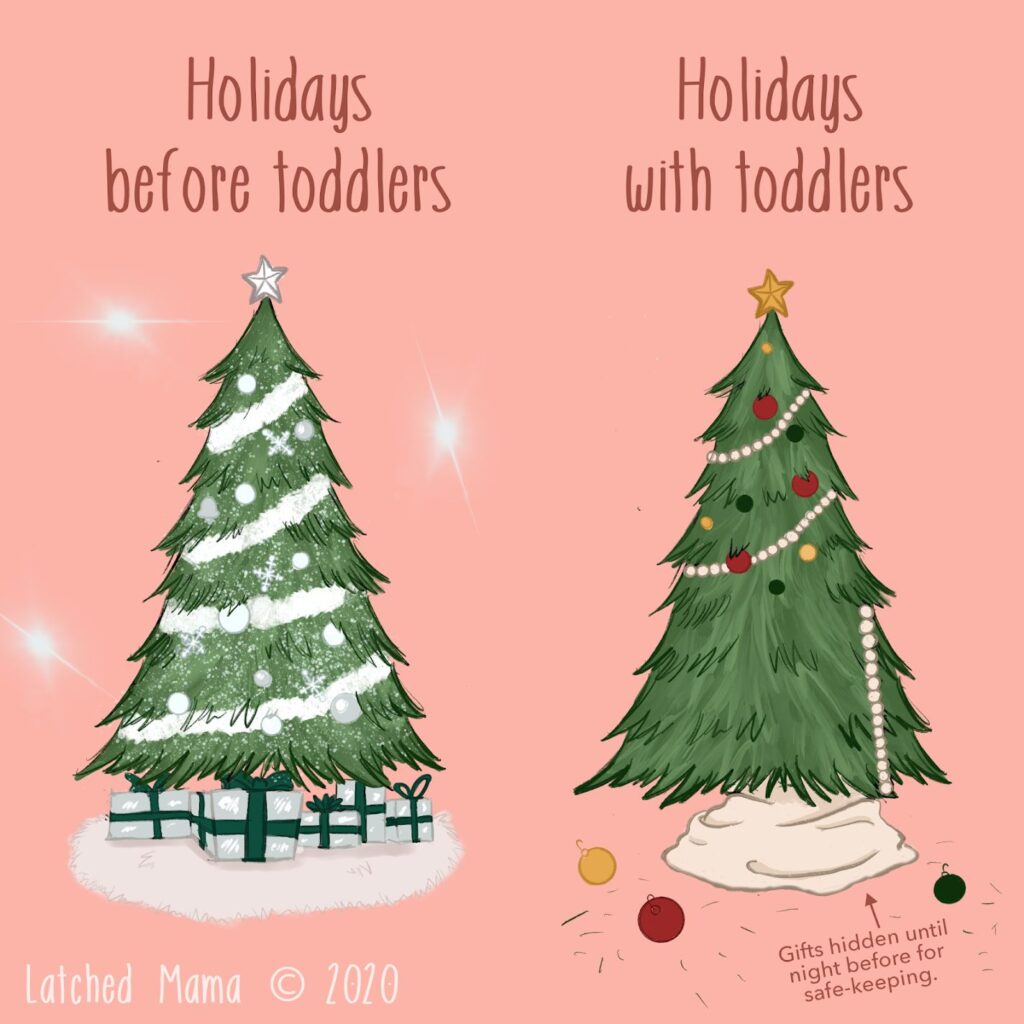










Merry, merry Christmas Season and Epiphany (Little Christmas)!



